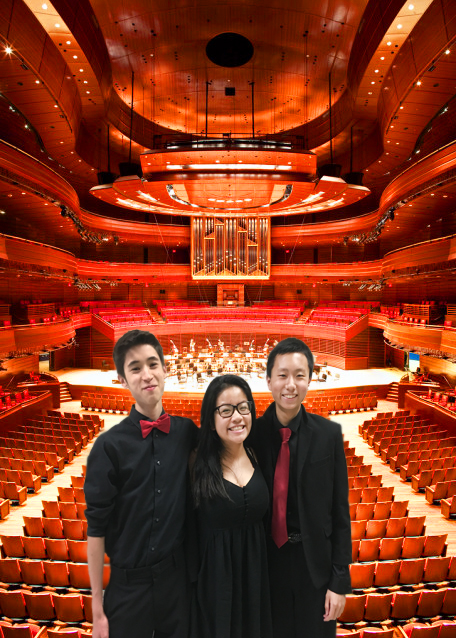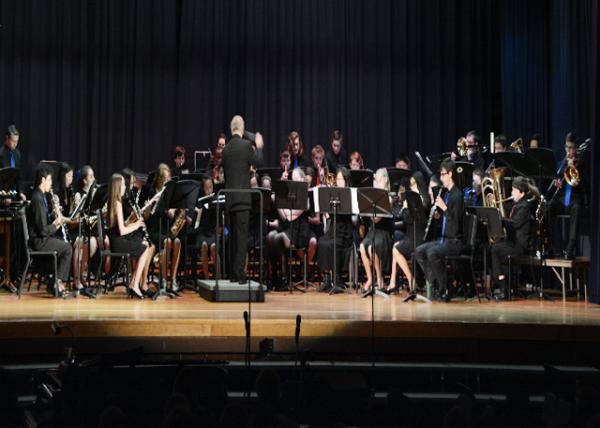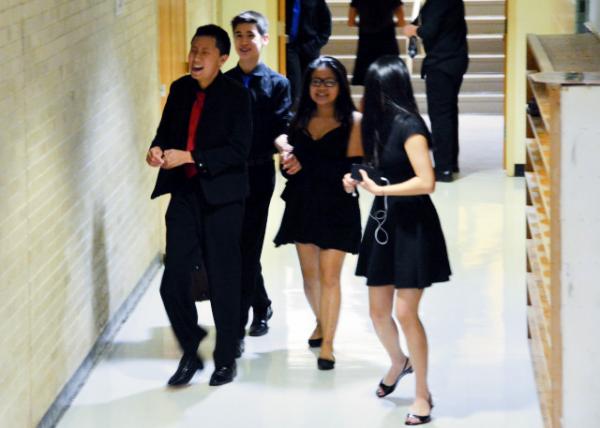2017-05-16 【Aiden in English】
The eighth-grade concert band is probably the most challenging one I've been in. Well, most of those in more advanced groups, such as the Wind Ensemble and Jazz Ensemble, understand how easy the grade bands are. However, this year was the beginning of my barista career. The Bari-sax, which stands for baritone saxophone, is a highly low version of the saxophone. It's double the length of an alto saxophone, which I started with. The neck twists around, lengthening the total distance the air has to travel. The more distance, the lower the note. It also means the air required nearly doubles that of an alto: lower notes, more air. The technique of the saxophone is all the same. I do not need to relearn any fingerings, positions, or posture. Instead, I must completely reshape my muscles. As an alto, the instinct to pinch and squeeze your embouchure is very tempting. However, a Bari-sax requires the player to throw out all those years of experience. I still clearly remember my first note, a middle G, to pop, then squeak, then falter out to nothing. Albeit embarrassing, this taught me how much there was still to learn in a band. The school deserves much credit for my instrument; I use a public saxophone with a personal mouthpiece. So, it essentially was a free opportunity to seize. This concert had an easy Bari-sax part, considering other areas. I feel slightly grateful to my teacher for this. I struggle with the low A, the single part that costs over a thousand dollars and takes many unnecessary breaths. Both these attributes will come with time, however discouraging. Moving on from the bad side of my abilities, I wish to flip the coin and view the band's accomplishments of the night. The most remarkable feat of this season of the band was "To Challenge the Sky and Heavens-Above" by Robert Smith. Not only did it sound like actual band music, but it exposed many sections of the band. That can be taken two ways. First, it sometimes has solo sections and many main parts. For example, I was passive in this tune, except for a specific section where the Bari-sax was grinding a 5/4 beat. I say "pretty much" because the tuba is always slow, so I carry most of the noise. That part's groove is impressive, like the Mission Impossible beat. The other way to interpret the exposure is that the sections play separate parts often, "exposing" inadequate levels. It is suitable for everyone to understand where they are now, even if it means playing alone. The pressure increased relatively with the separation, but it’s something the band will learn to appreciate. Independent thinking runs the world; people don’t stick to crowds. They wish to stand out. 【红霞译】
初中三年级表演乐队大概是我迄今所参加的乐队中最具挑战性的,多数成员还参加更高水准的音乐团体,譬如管乐队、爵士乐队,因此年级组织的乐队对这些人来说纯属小打小闹,然而,今年我开始吹奏上低音萨克斯管。
上低音萨克斯管是萨克斯管中非常少见的一种类型,比我初学上手的中音萨克斯管长两倍,脖管回转,结果增长了空气流动距离,殊不知距离越长音调越低。言外之意,上低音萨克斯管要比中音萨克斯管的共鸣腔要大两倍,音低气流更冲。
吹奏萨克斯管技巧都是一样的,我无需再学任何指法、按键或姿势,相反只要协调肌肉张弛就成。作为中音萨克斯手,拿捏唇型的模样非常诱人,不过吹奏上低音萨克斯管时演员要把多年来积累的经验全都抛到九霄云外。我还清楚地记得当年学吹第一个音符中央G时的场景,不是吐音时冷不丁冒出一声尖叫,就是吱吱嘎嘎胡乱作响,再不然干脆断了气。尴尬归尴尬,但乐队活动教我懂得要学的东西很多,值得称道的是学校为我提供乐器,我使用公家上低音萨克斯管,只需换上私人专用吹嘴即可,等于捞到一次免费学习机会。
从其它方面来看,音乐会中上低音萨克斯管的戏份平平,我对老师体谅之情不免心存感激,毕竟低音A很难吹,要知道附设这么一个部件耗资上千美元,我只能瞎使劲。但愿好事多磨,时间久了期待水平能有提高,只是当下尚无起色。
撇开我个人软肋不谈,我想把话题转到今晚乐队演出上来。本季音乐会乐队最拿手的作品就是罗伯特·史密斯《挑战苍穹》,这首曲子好像专门为乐队谱写的,乐队很多组成部分得以趁机大显身手。
应从两方面来看待这个问题。首先,每组乐器轮番独奏,分别表现华彩乐段。举例来说,演奏这首乐曲时我相当空闲,直到进入特定乐章,上低音萨克斯管才好不容易折腾出来5/4拍子,之所以说“好不容易”是因为大号手总掉链子,我难以摆脱杂音纷扰,那段合奏甭提有多来劲,其节奏配得上电影《碟中谍》。
其次,每组乐器常常各自为政,声部参差不齐,我觉得让乐队每位成员了解自己所在位置是件好事,即使独奏表演也应如此。 压力因各干各的而明显增大,但这正是乐队应该尊重的东西,况且这年头流行标新立异;人们不愿随大流,都想与众不同。 
8th-Graders of USBands @ Verizon Hall of Kimmel Performance Ctr (金梅尔演艺中心威瑞森大厅·初三学生出席美国中学管乐队音乐会 04-10-2017)  8th Grade Band (初三管乐队 05-16-2017) 8th Grade Band (初三管乐队 05-16-2017)
 Post Performance (演出后 05-16-2017) Post Performance (演出后 05-16-2017)
Crosslinks(相关博文):
2017 Pennbrook MS Spring Concert(2017年宾溪初中春季音乐会) 2016 Seventh-Grade Spring Concert(2016年初二春季音乐会)
2015 Mont Band Spring Concert(2015年蒙小管乐队春季音乐会) 2015 Sixth-Grade Spring Concert(2015年初一春季音乐会) 2014 Fifth Grade Spring Concert(2014年五年级春季音乐会) 8th Grade(初中三年级) |
